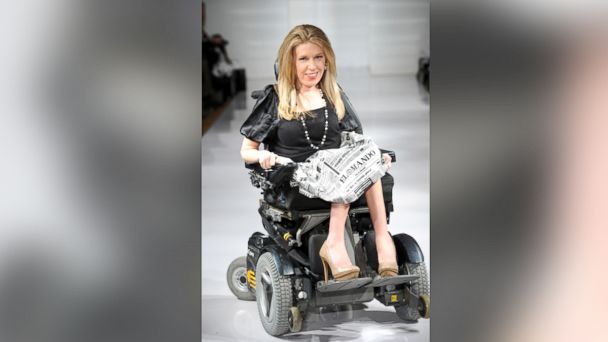First Model in Wheelchair at New York Fashion Week Has Message for Fashion Industry

Craig Barritt/Getty Images
The first woman to ever 'walk' the runway at New York Fashion Week in a wheelchair says she plans to open the door that's "tightly closed shut" and appeal to high-end fashion lines to use persons with disabilities as models.
"I feel like the industry has gotten more accepting of diversity but you never hear of a model in a wheelchair and it's just ludicrous," said Dr. Danielle Sheypuk, who made history Feb. 6 as a model at the Carrie Hammer fashion show in New York City.
"I would like the whole spectrum of fashion designers to tune in, all the way up to high fashion like Tory Burch, Gucci and Louis Vitton because, why not?" Sheypuk said. "Many of us have successful careers and we have money and we want to spend it and we want to look good."
Sheypuk, 35, who has been in a wheelchair since age five due to spinal muscular atrophy, is one of those career women she describes. She is a New York-based clinical psychologist and was Ms. Wheelchair New York 2012.
Though she modeled briefly in high school, in Scranton, Penn., Sheypuk never had dreams of being a runway model until she met Hammer at a gala last year. Hammer, who gave up a job in advertising sales to start her eponymous fashion line, asked Sheypuk to join other CEOs, entrepreneurs and even a former Miss USA as "role models," instead of runway models, in her show this year.
"I remember tons and tons of flashbulbs going off and people applauding a lot," Sheypuk said of her runway debut. "The consensus afterwards was that the models, all of us, we exuded this happiness and pride that infiltrated the room, and the audience reacted."
Sheypuk says she added some of her own "style and finesse" on the runway to differentiate herself from the other models who were able to do the "typical runway strut," but that walking on the runway was just like how she lives her daily life.
"My wheelchair is just a part of my body - an extension of me - and I'm the main focus, not the chair," Sheypuk said. "That's how I look at it and I moved that perspective to the runway."
Now Sheypuk, who will be featured this spring in the Raw Beauty Project, a series of glamorous and sexy images of women with disabilities, says it is time for all of the fashion industry to follow Hammer's lead.
"Fashion is about dressing the body that you have," Sheypuk said. "It doesn't matter what disability you have, or if you have one. It's about knowing what to accentuate."
"It's important for the fashion industry to demonstrate how to do this because we really have no role models out there in terms of the fashion industry," she said. "The only way we can really normalize being in a wheelchair and increase acceptance is if everyone is listening."
Hammer, who is currently in London preparing for fashion week there next week, says she, for one, is not only listening but plans to feature "role models" again at her second New York Fashion Week show, this fall, and take the concept even further.
"There was an energy and sense of thrill that I'd never felt before at a fashion show," Hammer told GoodMorningAmerica.com by email. "For Fall Fashion week we will have our second Role Model fashion show at Lincoln Center and the first row won't be media or buyers- it will be young girls and women who will learn that role models are the ones to look up to."
"The brands that step up to the plate by casting women who better and more accurately represent their customers will get big kudos and recognition," she said. "At the end of the day, aren't our customers what we do this for? Let be sure that we are empowering them rather than demoralizing them."